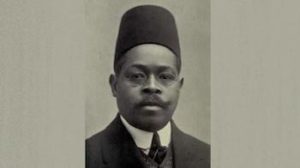
Duse Mohamad Ali
*Duse Mohamed Ali was born on this date in 1866. He was a Black African actor, journalist, businessman, and pan-Africanist.
Born in Alexandria, Egypt, to a Sudanese mother and an Egyptian father, Ali was destined never to stay long in the land of his birth. The actor, journalist, Pan-Africanist, and writer related that his father, Abdul Salem Ali, an Egyptian army officer, sent him to study in England at the age of nine. Ali eventually lost his knowledge of Arabic and contact with his family. From then on, he would spend the rest of his life living away from Egypt, traveling widely throughout the African community, and settling in England, the United States, and Nigeria.
His first career was in the theater. In 1885, at the age of 19, Ali became a stage actor, beginning with Wilson Barrett's British theatrical company and adopting the non-Arabic name Duse. He departed England the following year to tour and perform in the United States and Canada. While in the United States, Ali left the company and worked as a clerk for several years before returning to Britain in 1898 to resume acting for an additional 11 years.
In 1909, at the age of 40, he began his career as a journalist, publishing articles on Egyptian nationalism and African oppression in the New Age, an influential London-based socialist literary journal. Two years later, he published a short history of Egypt titled In the Land of the Pharaohs. Reputedly, the first history of Egypt was written by an Egyptian, and the book received critical acclaim, catapulting Ali into international prominence, especially Pan-Afrikan.
In 1912, he founded the African Times and Orient Review, a London political, cultural, and commercial journal. They advocated Pan-Afrikan-Asian nationalism, a forum for Afrikan intellectuals and activists worldwide. The journal covered issues in the United States, the Caribbean, West Africa, South Africa, Egypt, Asia, India, China, and Japan. Marcus Garvey, living in London at the time, briefly worked for Ali and contributed an article to the journal's October 1913 issue. It ceased publication in October 1918 and was succeeded by the African and Oriental Review, which operated through most of 1920.
Ali then traveled to the United States, never returning to Britain. There, he briefly worked in Garvey's Universal Negro Improvement Association movement, contributing articles on African issues to the Negro World and heading a department on African affairs. Ali had come to the United States to promote his vision of economic Pan-Africanism, seeking to establish a commercial link between West Africans and US Africans. In the 1920s, he unsuccessfully secured US African financing to enable West African farmers to secure markets and exports to the United States, wresting control from major British firms, such as Lever Brothers. In the 1930s, he failed to gain Euro-American capital for the same purpose.
In 1931, Ali left for West Africa permanently, settling in Lagos, Nigeria. There, he reestablished a career in journalism, becoming the founder and editor of The Comet, which in 1933 became Nigeria's largest weekly newspaper. In 1934, he serialized his novel, "Ere Roosevelt Came," which, among other things, touched upon his experiences with the African American struggle in the United States. From June 1937 to March 1938, he also serialized his autobiography, Leaves From An Active Life.
Traveling and forging relationships throughout the Afrikan world were central themes of his 78-year life journey. Duse Mohamad Ali retired from the newspaper's management in 1943 and died in Lagos two years later, on February 26, 1945, at the age of 78.
"Biographical Supplement:
Duse Mohamed Ali," in The Marcus Garvey and Universal Negro Improvement Association Papers,
Volume I: 1826-August 1919,
edited by Robert A. Hill and Carol A. Rudisell, Berkeley: University of California Press, 1983.
Ian Duffield, "Some American Influences on Duse Mohamed Ali," in Pan-African Biography, edited by Robert a Hill, Los Angeles: African Studies Center, University of California-Los Angeles, and Crossroads Press, African Studies Association, 1987.
Robert A. Hill, "The First England Years and After, 1912-1916," in Marcus Garvey and the Vision of Africa, edited by John Henrik Clarke and Amy Jacques Garvey, New York: Random House, 1974.
halil Mahumud, "Introduction to the Second Edition,"in In the Land of the Pharaohs: A Short History of Egypt, Second edition, by Duse Mohamed, London: Frank Cass, 1968.